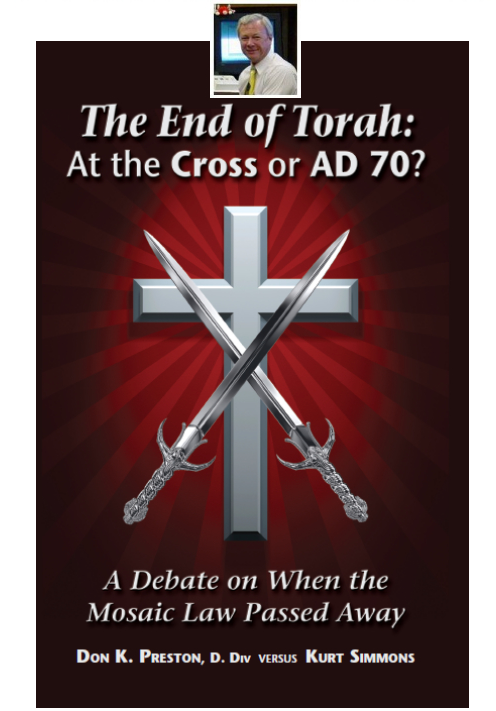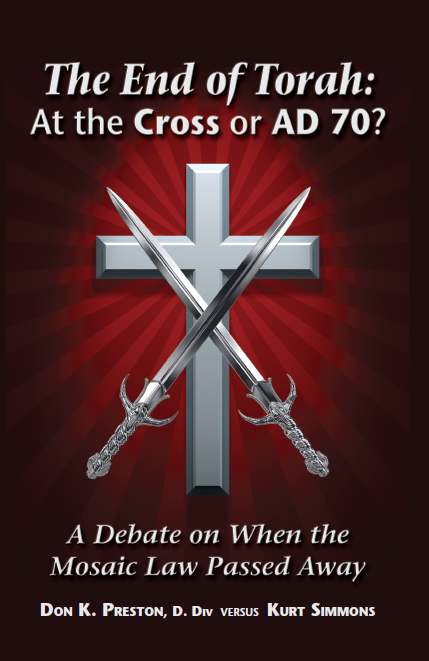The End of Torah?
“Two Guys and A Bible” dissect the futurist, Amil, Post Mil and Dominionist views of the end of Torah. Don and I have been recovering from illness, shoulder surgery in his case and a very cruddy cold in mine that has sapped a lot of energy. However, we are both on the upswing.
As we survey this new theology of the Law being both fulfilled in A.D. 70 and yet not being fulfilled until an alleged end of time, we search for consistency among it’s proponents only to find none. One would do well to listen to the recordings of David Chilton at the Oklahoma City Bible Prophecy Seminar of 1997.
End of the Law (Torah) Positions Argued
We noted in earlier years that the question of the fulfillment of the Law of Moses critically impacted the Amillennialists defense of a futurist eschatology. Some of their most notable positions in debate, were:
- The Law is fulfilled in A.D. 30, i.e. at the cross.
- The Law is fulfilled in A.D. 70, destruction of Jerusalem.
- The Law is fulfilled at the end of time.
Interestingly, they affirmed all three positions from one text, i.e. Matthew 5:17-18!
They were never quite able to find one position they could hang their eschatological futurist hat on for obvious reasons. If the Law was fulfilled at the cross, they had to explain how all the end time prophecies could escape fulfillment in the same time frame. Their usual response was a jaw drop to the floor when they understood their dilemma.
The next option was to have the Law unfulfilled until the end of time. This surely allowed them to get their eschatological prophecies in the future, albeit at the expense of carrying the Law forward as well. Thus, we invited them to “temple worship, perpetual animal sacrifices, sabbath-keeping and annual journeys to Jerusalem, which none of them were willing to practice.
In moments of sheer desperation, they admitted the Law was fulfilled in A.D. 70, and yet maintained futurist eschatology in spite of such admission with no valid arguments to support their claims, other than a reversal of the type/antitype hermeneutic paradigm to the antitype/type paradigm and seemingly no awareness or embarrassment for their contradictory stance.
The Law (Torah) Never Ends
Ironically, we have others who read the same text and say the law never ends. Such as we are seeing today is a repeat warming of an old bowl of soup. The only thing that has changed is the soup bowl.
Paul’s Eschatological Foundation in the Law
The Jews opposed Paul charging that he created dissension, profaned the temple and was a ringleader of the sect of the Nazarenes. Paul refuted all their charges with testimony accepted by Felix the governor who dismissed them. He boiled the Jewish opposition down to one central issue and a single statement.
“Or else let those who are here themselves, say if they found any wrongdoing in me while I stood before the council, ‘unless it is for this one statement which I cried out, standing among them, ‘Concerning the resurrection of the dead I am being judged by you this day.'” (Acts 24:20-21). emp. added.
That is the issue of the entire eschatological debate today. Was the resurrection taught in the Law and in the Prophets? Are the Law and the Prophets fulfilled? The answer to that question is the end of all debate! What was Paul’s response?
“Nor can they prove the things of which they now accuse me. But this I confess to you, that according to the Way which they call a sect, so I worship the God of my fathers, believing all things which are written in the Law and in the Prophets. I have hope in God which they themselves also accept, that there will be [is about to be, mellein] a resurrection of the dead, both of the just and the unjust.” (Acts 24:13-15, emp mine)
Paul’s point? Daniel 12:2 was about to be fulfilled. It would have no parallel time in history, Dan. 12:1; Matthew 24:21, equals the time when the power of the holy people was completely shattered, Dan. 12:7; Matthew 23:34-24:35, Lk. 21:20-22, and was the hour for those in the dust of the earth to awake out of sleep, Dan 12:2-3,Romans 13:11-12.
Was The End of Torah/Resurrection 2000 Years Away?
How could the unbelieving Jews expect to participate in an “about to be” resurrection that was almost two centuries away? Why would Paul testify under oath that this is the hope they were expecting? Ludicrous indeed!
If they believed Paul was teaching that the Law would not end for another 2000 years, why would they be concerned at all that Steven taught that Jesus was coming to destroy “this place” (the temple) and change the customs delivered to Moses? (Acts 6:13-14)
Did not Paul convert to Stephen’s religion by abandoning the Jews religion? Does this not tell us plainly that Paul taught what Stephen taught which is why they wanted him dead? Stephen surveyed the entire history of Israel and the prophets and never once mentioned the end of literal heaven and earth.
Isn’t that what they’re saying in Acts 24:5, i.e. that Paul espoused Stephen’s gospel of no physical land, no Moses, no temple and no Law?

